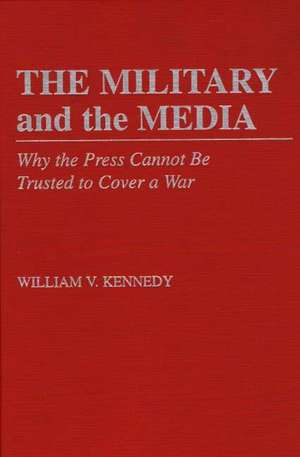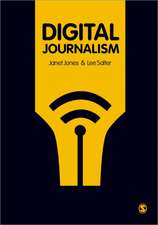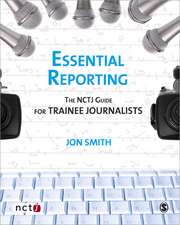The Military and the Media: Why the Press Cannot Be Trusted to Cover a War
Autor William V. Kennedyen Limba Engleză Hardback – 29 iul 1993 – vârsta până la 17 ani
Preț: 437.84 lei
Preț vechi: 604.23 lei
-28% Nou
Puncte Express: 657
Preț estimativ în valută:
83.78€ • 87.47$ • 69.34£
83.78€ • 87.47$ • 69.34£
Carte tipărită la comandă
Livrare economică 04-18 aprilie
Preluare comenzi: 021 569.72.76
Specificații
ISBN-13: 9780275941918
ISBN-10: 0275941914
Pagini: 184
Dimensiuni: 156 x 235 x 20 mm
Greutate: 0.52 kg
Ediția:New.
Editura: Bloomsbury Publishing
Colecția Praeger
Locul publicării:New York, United States
ISBN-10: 0275941914
Pagini: 184
Dimensiuni: 156 x 235 x 20 mm
Greutate: 0.52 kg
Ediția:New.
Editura: Bloomsbury Publishing
Colecția Praeger
Locul publicării:New York, United States
Notă biografică
WILLIAM V. KENNEDY began a career as a professional journalist as a 17-year-old cub reporter in 1945, and a military career as an enlisted man in the Regular Army in 1946. He has pursued both of these careers since. His work as a journalist specializing in military affairs has been published in all principal U.S. military journals and many U.S. and foreign professional and commercial journals and newspapers-including all major U.S. daily newspapers. He has served on active duty as an Intelligence Officer in the Strategic Air Command and as an Army Public Affairs Officer in the Pentagon, retiring from the Army Reserve in 1982 as a Colonel. From 1967 to 1984 he served as a civilian member of the U.S. Army War College Strategic Studies Institute and U.S. Army War College Faculty, returning to full-time military journalism in 1984. He is a principal author of The Intelligence War (1983), an internationally recognized text on the subject.
Cuprins
IntroductionWhy the Press Cannot Be Trusted to Cover a WarThe Roots of ConflictTelevision: The Here, Now, and Obituary MediumThe Dailies: Shaky BedrockThe Wire Services: The Weakest ReedThe MagazinesVietnam: The WatershedAftermathManaging the Right to LieHow to Defeat the "Right to Lie"EpilogueSelect BibliographyIndex
Recenzii
In this harsh indictment of the nation's print and electronic press, Kennedy offers copious evidence to support the subtitle of his book. The author, a longtime military officer and reporter, provides an extensive bibliography and documentation. Upper-division undergraduates and above.
I strongly recommend you read this book--perhaps even add it to your personal library. It is an outstanding primer for military personnel who may find themselves faced with handling the press during a contingency or emergency.
This book provides an unmatched contemporary analysis of the fourth estate and its impact on military affairs. Anyone with a need to understand military-media relations and the potential impact of the media on future military operations needs to save a space on the bookshelf.
.William V. Kennedy turns tables-for here the military are heroes and the news media personnel (both print and broadcast) are not to be trusted-the reverse of most books on wartime journalism. The author argues for more specialized reporters dealing with complex military matters and until that time, greater military control of media access to battlefields.
I strongly recommend you read this book--perhaps even add it to your personal library. It is an outstanding primer for military personnel who may find themselves faced with handling the press during a contingency or emergency.
This book provides an unmatched contemporary analysis of the fourth estate and its impact on military affairs. Anyone with a need to understand military-media relations and the potential impact of the media on future military operations needs to save a space on the bookshelf.
.William V. Kennedy turns tables-for here the military are heroes and the news media personnel (both print and broadcast) are not to be trusted-the reverse of most books on wartime journalism. The author argues for more specialized reporters dealing with complex military matters and until that time, greater military control of media access to battlefields.















